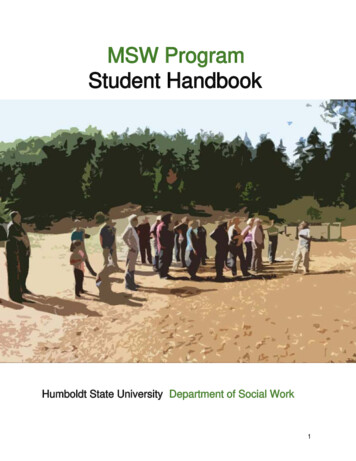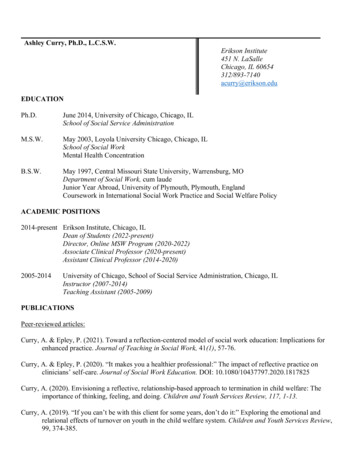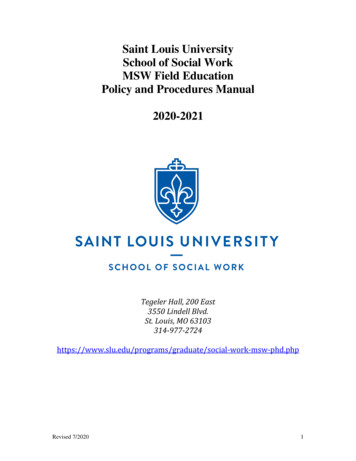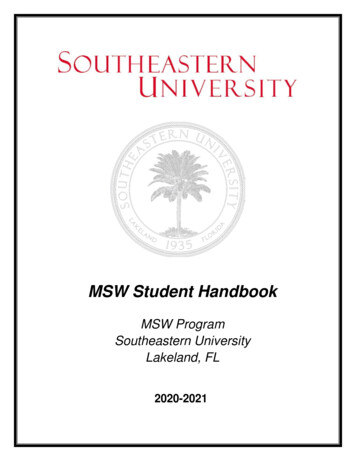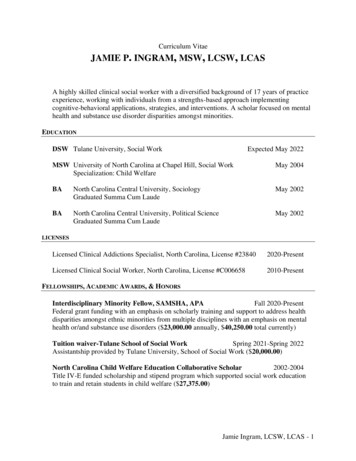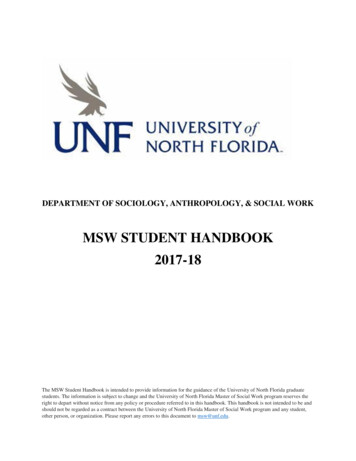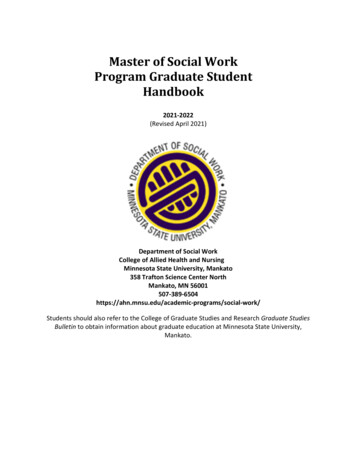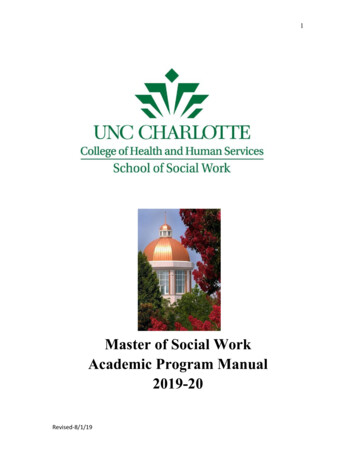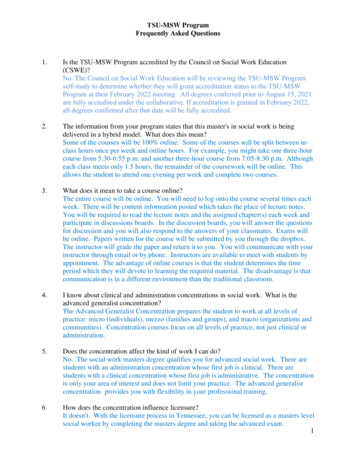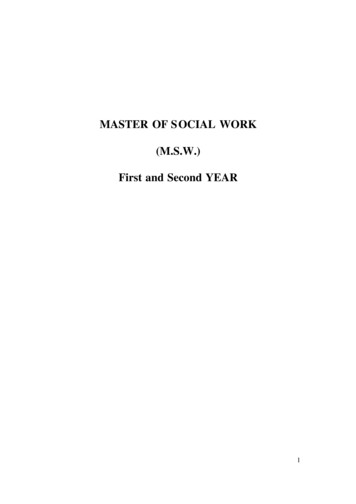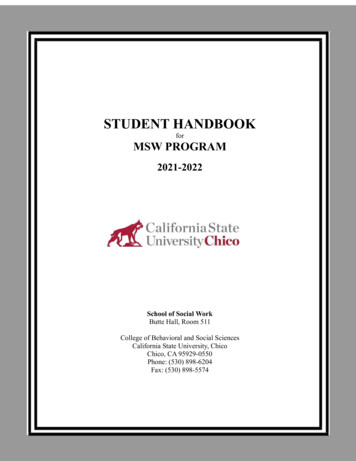
Transcription
STUDENT HANDBOOKforMSW PROGRAM2021-2022School of Social WorkButte Hall, Room 511College of Behavioral and Social SciencesCalifornia State University, ChicoChico, CA 95929-0550Phone: (530) 898-6204Fax: (530) 898-5574
California State University, Chico, School of Social WorkMSW Student Handbook 2021-2022TABLE OF CONTENTSTUDENT HANDBOOKPREFACELand Acknowledgement of Chico StateWelcome to the Master of Social Work (MSW) ProgramSCHOOL OF SOCIAL WORK ADMINISTRATIONHISTORY OF THE CHICO STATE SCHOOL OF SOCIAL WORKMASTER OF SOCIAL WORK PROGRAM:SCHOOL MISSION AND GRADUATE GOALS AND OBJECTIVESMission Statement for the School of Social WorkStatement of Inclusivity for the School of Social WorkStatement of RespectStatement of Unqualified Respect for Human Diversity and Nondiscriminationfor the School of Social WorkGoals of the MSW ProgramCompetencies of the MSW ProgramMASTER OF SOCIAL WORK PROGRAM:REQUIREMENTS FOR THE GRADUATE DEGREEOverview of the MSW Program CurriculumRequirements for the MSW DegreeField Education RequirementRequirements for the One-Year MSW ProgramRequirements for the Two-Year MSW ProgramRequirements for the Three-Year MSW Program: Distributed Learning (DL) FormatMSW AdvisingRequired Notice to Students RE: Professional Licensure and CertificationRequirements for Disclosure on Legal Charges/ConvictionsSchool of Social Work Course DescriptionsElective CoursesOther Approved Graduate Elective CoursesMASTER OF SOCIAL WORK PROGRAM:TECHNOLOGY SUPPORTInternet AccessComputerEmail PolicyBlackboard Learn (BbLearn)Logging into Blackboard Learn 3141415151515151516
California State University, Chico, School of Social WorkMSW Student Handbook 2021-2022ZoomGoogle DriveFree SoftwareMeriam Library AccessCALIFORNIA BOARD OF BEHAVIORAL SCIENCESPRE-LICENSURE COURSEWORKBBS Pre-Licensure RequirementHours NeededMSW Course CompletedNotice to Students Regarding Professional Licensure or CertificationMASTER OF SOCIAL WORK PROGRAM:SPECIALIZED TRAINING PROGRAMMSW Title IV-E ProgramMASTER OF SOCIAL WORK PROGRAM:GRADUATE GRADING REQUIREMENTSGrading System and PoliciesGrade PercentagesDefinition of Letter Grade Symbols: Graduate CoursesUse of Plus/Minus SymbolsComputation of Grade Point Average (GPA)Other Grade Symbols DefinedGrades for MSW CoursesResponsibility for Assignment of GradesGrade Point Average and Grade RequirementsGrades for the Graduate Writing Proficiency RequirementGrades for the Field PracticumRepeating Field Practicum2021-2022 UNIVERSITY CATALOG:GRADUATE EDUCATION POLICIESRegulations Governing Graduate StudentsStudent ResponsibilityGraduate CoordinatorsChange in ClassificationGraduate Conditionally ClassifiedGraduate ClassifiedCandidacyChange in DisciplineMultiple Degree 0202121222222222424242424242424252525
California State University, Chico, School of Social WorkMSW Student Handbook 2021-2022Continuous EnrollmentMaintaining Good Academic Standing and Academic ProbationDefinition of a Full-Time Graduate StudentGraduate Credit for Excess Units Taken as an UndergraduateMaster's Degree CoursesIndependent Study (697), Comprehensive Examination (696), and Master’s Study (699)Applying for Graduation with Master’s Degree and Participation in Master’s CommencementGraduation with Distinction/Outstanding Thesis and Project AwardsLibrary Privileges for Graduate StudentsMaximum Course LoadRepeating Courses with ForgivenessMaster’s Degree Program Time LimitValidation of Expired CourseworkSpecifications for Master’s Theses and ProjectsHuman and Animal Subjects in ResearchTransfer and Special Session Credit2021-2022 UNIVERSITY CATALOG:ACADEMIC POLICIES AND REGULATIONSAcademic HonestyAttendance in ClassesAuditing CoursesCredit HoursCourse Credit PoliciesCourse Registration, Change of Program, and Withdrawal PoliciesCourse Selection PoliciesCourse ObjectivesAssignment and Change of GradesGrievance Procedure Related to GradesAcademic Disqualification, Not on ProbationNotice of DisqualificationAdministrative-Academic ProbationAdministrative-Academic DisqualificationRepeating Courses: General Repeat for GraduatesRepeating Courses: Graduate Repeat with ForgivenessMASTER OF SOCIAL WORK PROGRAM: POLICIES AND PROCEDURES FORTRANSFER OF CREDIT AND USE OF PROFICIENCY EXAMINATIONSTransfer of Social Work Courses from Other CSWE Accredited MSW ProgramsCompleted Foundation Year from Other CSWE Accredited MSW 2929293030303131313131313233333333
California State University, Chico, School of Social WorkMSW Student Handbook 2021-2022Other Master’s Degree ProgramsProficiency ExaminationsMASTER OF SOCIAL WORK PROGRAM: POLICIES AND PROCEDURES FORPLANNED EDUCATIONAL LEAVE FROM THE UNIVERSITYPlanned Educational Leave ProceduresAlternative Educational PlanMedical LeaveAdjunct EnrollmentMASTER OF SOCIAL WORK PROGRAM: POLICIES AND PROCEDURES FORCULMINATING ACTIVITY (COMPREHENSIVE EXAM, THESIS, PROJECT)Comprehensive ExamThesis/Project DefinedThesis/Project School of Social Work PolicyThesis/Project CommitteeThesis/Project ProposalThesis/Project Final Draft & DefenseThesis/Project – Recommended Submission DatesMASTER OF SOCIAL WORK PROGRAM: POLICIES AND PROCEDURES FORADDRESSING STUDENT ACADEMIC CONCERNSInformal Review of Academic PerformanceFormal Review of Academic PerformanceMSW STUDENT ROLES AND RESPONSIBILITIES OF GRADUATE STUDENTSMSW STUDENT PARTICIPATION ON SCHOOL OF SOCIAL WORK COMMITTEESMASTER OF SOCIAL WORKER STUDENT ASSOCIATION (MSWSA)MSW Student Association OverviewMSW Student Association ObjectivesCHICO STATE POLICY: SIGNIFICANT EXECUTIVE 454647474750
California State University, Chico, School of Social WorkMSW Student Handbook 2021-2022PREFACELand Acknowledgement of Chico StateWe acknowledge and are mindful that Chico State stands on lands that were originally occupied by the firstpeople of this area, the Mechoopda, and we recognize their distinctive spiritual relationship with this landand the waters that run through campus. We are humbled that our campus resides upon sacred lands thatonce sustained the Mechoopda people for centuries.Welcome to the Master of Social Work (MSW) ProgramThe faculty and staff of the California State University, Chico (Chico State), School of Social Work haveprepared this MSW Student Handbook to inform you about the School’s policies, procedures, andinformation regarding the program. It is important that you become familiar with the contents of yourStudent Handbook; it provides an overview of what to expect in the program. The Student Handbook maysave you considerable time and challenges if you know this information initially.You will also want to become familiar with the University's Office of Graduate Studies, as well as their AGuide to Graduate Studies.The School of Social Work is housed within the College of Behavioral and Social Sciences (BSS) and isalso under the auspices of the Office of Graduate Studies. Therefore, the MSW Program is subject to thepolicies and procedures of those bodies, as well as the University. To make yourself aware of theserequirements, please become familiar with the 2021-2022 University Catalog.Since the policies and procedures of the School of Social Work are constantly under review and revision,stay in close communication with the MSW Program Director. You are highly encouraged to attend thescheduled “group advising” meetings that occur approximately four times per year. You will be provided aschedule of these meetings at the beginning of each semester.The School of Social Work website is updated regularly and provides the most current version of policiesand procedures, as well as other valuable information. Your faculty adviser is also an important source ofinformation; thus, you will want to become acquainted and utilize their guidance and expertise.For important dates and meeting locations, the School of Social Work calendar and Distributed Learning(DL) calendar.We wish you the best as you begin the MSW program at Chico State. Please let us know if you have anyquestions. We look forward to your participation in our professional program.Chelsea Cornell, MSWMeka Klungtvet-Morano, MSWMSW Program Co-DirectorMSW Program @csuchico.edu6
California State University, Chico, School of Social WorkMSW Student Handbook 2021-2022SCHOOL OF SOCIAL WORK ADMINISTRATIONSusan Roll, PhD, ProfessorSchool of Social Work Directorsroll@csuchico.edu530-898-6204Chelsea Cornell, MSWMSW Program Co-Directorccornell1@csuchico.edu530-898-6754Meka Klungtvet-Morano, MSWMSW Program Co-DirectorShannon GrubertAdministrative Support Coordinator IISchool of Social Workscgrubert@csuchico.edu530-898-6204Jaime NelsonAdministrative Support Assistant IIMSW & BSW Programsjlnelson@csuchico.edu530-898-5043Celeste A. Jones, PhD, ProfessorDistributed Learning Coordinatorcajones@csuchico.edu530-898-6205Melissa CheathamDistributed Learning Advisormcheatham@csuchico.edu530-898-5235Patrick Borel, MSW, Assistant ProfessorField Education Directorpborel@csuchico.edu530-898-5875Nicole DavisField Placement Coordinator Field Programnmdavis@csuchico.edu530-898-5632Chelsea Cornell, MSWTitle IV-E Program Coordinatorccornell1@csuchico.edu530-898-6754Meka Klungtvet-Morano, MSWTitle IV-E Program 874Nica DigmonAdministrative Support Assistant IITitle IV-E Programvdigmon@csuchico.edu530-898-3275Jené RaboAdministrative Support Assistant IITitle IV-E orano@csuchico.edu530-898-6754Please visit the School of Social Work Faculty & Staff website for a list of Faculty and Staff information7
California State University, Chico, School of Social WorkMSW Student Handbook 2021-2022HISTORY OF THE CHICO STATE SCHOOL OF SOCIAL WORKSocial Work studies at Chico State began in 1956. Due to a growing need for trained social workersthroughout northern California, the Northeastern County Welfare Directors enlisted the support of theCalifornia State Legislature and lobbied Chico State to establish a program to deliver undergraduatedegrees in social welfare. To develop the social welfare program, Chico State hired the late Dr. ArchieMcDonald in 1958 as the coordinator. In 1959, the undergraduate program in social welfare wasestablished with Dr. McDonald as its sole full-time faculty member. McDonald was the chair of theprogram until 1969 and retired as a teaching faculty member in 1987. He established three undergraduatesocial work scholarships bearing his name: The Archie McDonald Social Work Scholarships for AcademicExcellence, Professional Service, and the Social Work Sophomore Scholarship; one Master of Social Work(MSW) Scholarship named for his wife, Lois McDonald.The undergraduate program grew as faculty members were hired and developed new courses. Faculty hiredduring this growth period were Dr. Virginia Lawrence (1966), Dr. Roy Brazzale and Professor MarkJoralemon (1969), Professors Art Preciado and Walter Zahnd (1972), Dr. Bernie Davitto (1973) andProfessor Jan O’Donnell (1974). In 1971, the social work program became the Department of SocialWelfare and Corrections under the Division of Special Academic Programs, and subsequently, the Schoolof Health and Human Services.The undergraduate Social Work Program has held “constituent membership” and “approved status” withthe Council on Social Work Education (CSWE) from 1960 until 1974. It has been fully and continuouslyaccredited since 1974. The high quality of the undergraduate program and its collaborative relationshipwith agencies throughout the region during this time provided a solid foundation for expansion of theSchool and its programs.When the School of Health and Human Services was disbanded in 1979, the Department of Social Welfareand Corrections joined the School of Behavioral and Social Sciences under the leadership of James O.Haehn. The departments of Social Work and Sociology merged in 1984, during California’s time of fiscaldifficulties, and became the Department of Sociology and Social Work. Although this arrangement provedto be highly collegial for the faculty and students, the process of separating the two programs began in1999 to allow for development of the Master in Social Work (MSW) program.Planning for the MSW program was initiated at the request of the Directors of Social Services Agenciesthroughout the 12 northern California counties. Chico State’s faculty and students conducted a feasibilitystudy in 1998. The Chico State Academic Senate approved the Master of Social Work Degree Program andthe creation of a new administrative unit, “The School of Social Work” within the College of Behavioraland Social Sciences. Once eight additional faculty members and support staff were hired, the curriculumdeveloped, and the self-study completed, the MSW program was awarded full accreditation in February2005 by the Council on Social Work Education (CSWE). CSWE is the accreditation organization for allsocial work education programs in the United States.8
California State University, Chico, School of Social WorkMSW Student Handbook 2021-2022MASTER OF SOCIAL WORK PROGRAM:SCHOOL MISSION AND GRADUATE GOALS AND OBJECTIVESMission Statement for the School of Social WorkThe mission of the School of Social Work is to provide accessible, high quality education for generalistpractice at the baccalaureate level and advanced generalist practice at the graduate level. We educatestudents to be ethical, knowledgeable, and versatile practitioners and leaders who value collaboration,social and economic justice, and lifelong learning. (Currently being re-visited/updated)Statement of Inclusivity for the School of Social WorkIn the spirit of shared humanity and concern for our community and world, the School of Social Workfaculty and staff celebrate diversity as a strength and as central to our mission. We affirm our solidaritywith diverse individuals and groups with whom we work and value their strengths and resilience. In linewith social work values and ethics, we disavow all racism, xenophobia, homophobia, transphobia, sexism,Islamophobia, anti-Semitism, classism, ableism, and hate speech or actions that attempt to silence,threaten, and degrade others.The School of Social Work affirms that language, stories and relationships help us to understand theexperiences of others whose lives are different from ours. We value equality of opportunity andmeaningful participation for all people. Building on these capacities, we hope to inspire empathy, socialand environmental justice, and an ethical framework for our actions. We advocate for communities ofcolor and people of varied ethnicities, origins, sexualities, gender identities, religions, ability, body size,and many other intersectional identities.Statement of RespectEducation is transformative. Students in this class are encouraged to participate during class meetings.Because the class will represent a diversity of individual beliefs, backgrounds, and experiences, we askthat every member of each class show respect for every other member of each class.Statement of Unqualified Respect for Human Diversity and Nondiscriminationfor the School of Social WorkAs stated in the National Association of Social Workers Code of Ethics, specified within the EducationalPolicy and Accreditation Statement (EPAS) of the Council on Social Work Education (CSWE), andconsistent with the California State University, Chico's Policy on Nondiscrimination and Affirmative Actionin Employment and Education, we the faculty, staff, and students of the School of Social Work:1. Advocate the elimination of any form of discrimination on the basis of age, class, socioeconomicstatus, color, disability, ethnicity, family structure, gender, marital status, national origin, race,religion, sex, sexual orientation and other physical, psychological or social characteristics.2. Are committed to teach, encourage, and promote an appreciation, respect, and understanding ofhuman diversity in the School of Social Work, California State University, Chico, our professions,and our communities.3. Affirm the value of soliciting, incorporating, and respecting human diversity into all aspects of oureducational experiences, our profession, and our personal lives as ways to enrich our total lifeexperience individually and collectively as members of a diverse world community.9
California State University, Chico, School of Social WorkMSW Student Handbook 2021-2022Goals of the MSW ProgramTo fulfill its mission, the MSW Program will work toward the following goals:1. Prepare social workers to provide leadership for social service agencies and communities inNorthern California and the profession.2. Prepare social workers with the knowledge, values, ethics and skills for advanced generalistprofessional practice with multi-level systems.3. Prepare social workers for culturally aware practice in diverse settings with an emphasis on theNorthern California region.4. Prepare social workers as leaders in advocacy and social and political action to promote humanrights, social and economic justice.5. Prepare social workers to commit themselves to the profession enhancement and their ownprofessional conduct and growth.6. Partner with community service agencies to produce competent and ethical social workers.7. Prepare social workers to think critically and effectively utilize various sources of information tobuild on strengths and address complex problems.Competencies of the MSW ProgramThe competencies of the MSW program align with the Council on Social Work Education’s (CSWE)Education Policy and Accreditation Standards (EPAS):1. Demonstrate ethical and professional behavior.2. Engage diversity and difference in practice.3. Advance human rights and social, economic, and environmental justice.4. Engage in practice-informed research and research-informed practice.5. Engage in policy practice.6. Engage with individuals, families, groups, organizations, and communities.7. Assess individuals, families, groups, organizations, and communities.8. Intervene with individuals, families, groups, organizations, and communities.9. Evaluate practice with individuals, families, groups, organizations, and communities.10
California State University, Chico, School of Social WorkMSW Student Handbook 2021-2022MASTER OF SOCIAL WORK PROGRAM:REQUIREMENTS FOR THE GRADUATE DEGREEOverview of the MSW Program CurriculumThe MSW program prepares students for Advanced Generalist practice that consists of a broad-based set ofknowledge, values, and skills necessary for advanced social work practice with multi-level systems. Themajor emphases are direct services to individuals, families, and groups; community and organizationalpractice; policy analysis and practice; and research for practice. The electives, comprehensive examination,and thesis/project augment the student’s advanced practice expertise.Requirements for the MSW DegreeFor the MSW degree to be conferred, students must meet the following criteria as specified in the2021-2022 University Catalog Master’s Degree Requirements (Completion and Final Approval section):1. Completion of all requirements of the MSW Program and the Office of Graduate Studies;2. Completion of a culminating activity as specified by the MSW Program and the Office of GraduateStudies: thesis, project, or comprehensive examination (along with two electives);3. Approval by the School’s MSW Program Director on behalf of the faculty of the university.Field Education RequirementThe MSW program requires a total of 480 hours of practicum during the Foundation year, and 720 hours ofpracticum during the Concentration year. Practicum must occur in our service region. Employment-basedpracticum positions are considered on an individual basis when agencies are able to provide the studentwith a position that is educationally focused and involves tasks other than normal work duties. Studentswho are placed in an employment-based field placement are required to sign an Employment-BasedPracticum Proposal form to facilitate communication with the agency. For more detailed information,please see the current version of the MSW Field Education Handbook on our Field Handbook, Calendars,& Competencies website.Requirements for the One-Year MSW ProgramStudents who have obtained a social work baccalaureate accredited by the Council on Social WorkEducation (CSWE) within five years, and who meet other School of Social Work criteria for entry into theOne-Year Program, may be eligible for the One-Year MSW Program.Students admitted into the One-Year MSW Program must complete 30-32 units of 600-level social workConcentration courses (from the Two-Year MSW Program Concentration year course sequence), plus oneadditional 4-unit course that must be completed during the summer session prior to entering theConcentration year of study. Students complete 720 hours of field education practicum in our serviceregion. This program requires a total of 34-36 units (depending on program plan) of course work.Requirements for the Two-Year MSW ProgramStudents who have obtained a baccalaureate degree other than in social work, and are admitted into theTwo-Year MSW Program, must complete 31 units of 600-level social work Professional Foundationcourses prior to the 30-32 units of 600-level social work Concentration courses. Students complete a totalof 1200 hours of field education practicum in our service region. This program requires a total of 61-63units (depending on program plan) of course work.11
California State University, Chico, School of Social WorkMSW Student Handbook 2021-2022Requirements for the Three-Year MSW Program: Distributed Learning (DL) FormatThe Three-Year MSW DL Program provides the same curriculum as the Two-Year MSW Program except itis delivered in a distributed learning format over the period of three years. This program admits studentsonce every three years. Through the DL program, curriculum is delivered in a hybrid format that combinesonline asynchronous coursework, online synchronous coursework, and face-to-face class sessions on theChico State campus. Students are expected to attend three class sessions on Zoom and class sessions oncampus during two weekends each semester (fall, spring, and summer) for each hybrid course. Somecourses will be offered in a fully online asynchronous format. For more detailed information about meetingtimes and dates, please see the current version of the MSW DL Calendar on our DL Calendars.For an optimal educational experience in the DL program, students will need a laptop with Wordprocessing (Microsoft Office 365 software suite is free to Chico State students), a webcam, high speedinternet, and basic computer literacy skills.Students admitted into the Three-Year MSW Program must complete 31 units of 600-level social workProfessional Foundation courses prior to the 30-32 units of 600-level social work Concentration courses.Students complete a total of 1200 hours of field education practicum in our service region. This programrequires a total of 61-63 units (depending on program plan) of course work.MSW AdvisingPrior to the beginning of classes, students are directed to contact the MSW Director with questionsregarding the MSW program and their graduate education experience. Students are introduced to theirfaculty program advisor during the mandatory orientation in the Fall semester. After the beginning ofclasses, students are directed to consult the faculty adviser assigned to them for the following purposes: To assess her/his aptitude and motivation for social work To become knowledgeable regarding potential field settings To decide whether to complete a thesis, project, or comprehensive examination To assist in selecting the thesis or project chair, and committee when appropriate To assist in monitoring academic performance (when a student’s GPA is in danger of falling below a3.0, or a student has failed to maintain a solid B where required, the adviser consults with thestudent to develop a corrective plan) To notify the MSW Director of academic and professional performance difficulties, and/or to notifythe Field Education Director of problems in the field practicum To consult, support, and guide when program difficulties or concerns arise To assist in locating campus resources and making referrals when appropriate To provide suggestions and alternatives for another career choice or major if appropriateRequired Notice to Students RE: Professional Licensure and CertificationCalifornia State University programs for professions that require licensure or certification are intended toprepare the student for California licensure and certification requirements. Admission into programs forprofessions that require licensure and certification does not guarantee that students will obtain a license orcertificate. Licensure and certification requirements are set by agencies that are not controlled by oraffiliated with the California State University and licensure and certification requirements can change atany time. The California State University has not determined whether its programs meet other states’12
California State University, Chico, School of Social WorkMSW Student Handbook 2021-2022educational or professional requirements for licensure and certification. Students planning to pursuelicensure or certification in other states are responsible for determining whether, if they complete aCalifornia State University program, they will meet their state’s requirements for licensure orcertification. This disclosure is made pursuant to 34 CFR §668.43(a)(5)(v)(C).Requirements for Disclosure on Legal Charges/ConvictionsAt the time of admission into the Master of Social Work (MSW) program at Chico State, applicants arenot asked to disclose legal history. However, all applicants accepted into the MSW program will need tosecure a field placement which may require legal background clearance. Therefore, after being acceptedinto the MSW program, please discuss with the field director any felony or misdemeanor convictions, andany other legal system involvement that could come up during the legal background clearance process. Ifa legal history prevents you from securing a field placement, you will not be able to remain in the MSWprogram. In addition, some legal histories may prevent you from receiving a license in clinical socialwork (LCSW) from the state of California. Students are responsible for determining whether they canmeet licensure requirements. Information can be found at the California Board of Behavioral Science(BBS) website.Students considering an MSW who have been charged with or convicted of a misdemeanor or felonyshould be aware of the following: As social workers, we believe people who have committed criminal acts in the past can change andrehabilitate themselves and become useful, productive and law abiding citizens of society and, byextension, well-qualified social workers. However, we also understand the need for agencies toprotect their clients and their reputations by thoroughly investigating the criminal records ofstudent interns and potential employees. As policy, some agencies are mandated by law to require a criminal background check on allemployees, interns, and volunteers. The fact that persons have been convicted of a misdemeanor or felony will not preclude theiracceptance or entry into a program offered by the School of Social Work. However, admission to aSchool of Social Work program does not guarantee graduation or acceptance by an agency forfield practicum. Some state licensure laws for social workers ask whether the applicant has been charged with, orconvicted of, a misdemeanor or felony prior to allowing the applicant to sit for the licensureexamination. The BBS does encourage applicants to report misdemeanor and felony convictionson their application for the Licensed Clinical Social Work (LCSW) license. In addition, the BBSwill receive applicants’ Criminal Offender Record Information (CORI) from the CaliforniaDepartment of Justice. If there is criminal history present, the BBS may request additionalinformation about the nature and rehabilitation of the crime.Applicants and students in this situation are strongly advised to consult with their program advisers, theMSW Program Director, the Director of Field Education, and/or the Director of the School. Having acriminal conviction on record does not disqualify applicants, students, and/or graduates from all internship,employment opportunities, or licensure, but it is something to be aware of when applying for and enteringour program.School of Social Work Course DescriptionsMSW course descriptions can be found in the 2021-2022 University Catalog. MSW course sequences foreach of the three program options can be found at MSW Course Sequences. Please note that each of the13
California State University, Chico, School of Social WorkMSW Student Handbook 2021-2022three MSW programs has specific course sequencing. Students enrolled in a full-time program (One-Yearand Two-Year) may not enroll in courses in the part-time program (Three-Year), and vice versa.Elective CoursesStudents who choose to complete the comprehensive exam as their MSW Program Culminating Activitymust complete two elective courses in the Concentration year as part of the MSW program. Students whochoose to complete a thesis/project as their MSW Program Culminating Activity must complete twothesis/project courses. Students will be enrolled into SWRK 699T/P courses by the School of Social Work,one each semester of the Concentration year, for a total of two semesters. Please note that not all electivesare offered each semester or year, and courses are subject to change.SWRK 673Trauma and Loss3.0SWRK 674Programs, Policies & Pra
Welcome to the Master of Social Work (MSW) Program 6 SCHOOL OF SOCIAL WORK ADMINISTRATION 7 HISTORY OF THE CHICO STATE SCHOOL OF SOCIAL WORK 8 . To develop the social welfare program, Chico State hired the late Dr. Archie McDonald in 1958 as the coordinator. In 1959, the undergraduate program in social welfare was .
